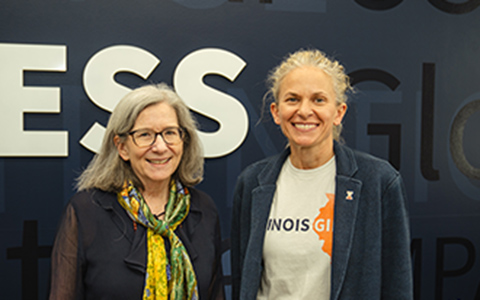Jul 8, 2025
McNichols’ introductory accounting course at Illinois led to her four-decade career at Stanford

When Maureen McNichols (ACCY ‘75, MAS ‘76) reflects on why she chose to pursue a career in higher education, she thinks about her mother, an introductory accounting course, and the excitement she felt to be a student at University of Illinois.
McNichols is a renowned accountancy professor who has contributed a substantial body of research to the business community, especially in illuminating the kinds of frictions that exist between company and investor interests.
She is the Marriner S. Eccles Professor of Accounting and Public and Private Management at Stanford Graduate School of Business. In addition to her research, she has served the profession in editorial roles for several top accounting journals and as a member of the Public Company Accounting Oversight Board Standing Advisory Group.
Her extensive career has been fueled by her lifelong curiosity and passion for learning, but she wasn’t always sure that she would pursue a career in academia.
McNichols’ mother, Marjorie McNichols, taught math at University of Illinois Chicago and along with her father, was instrumental in encouraging her to attend college at Illinois’ flagship university.
In her first two years of undergrad, “I took every possible subject,” she said. “I was having a very hard time choosing what to get my degree in. I had been taking math classes, and they were getting more and more abstract. I really loved the problem-solving aspect, but I didn’t know how I would apply it.”
But that changed, she said, when she took her first accounting class in the last semester of her sophomore year.
“From that point on I could see how accounting information could really help people make better decisions, within firms and as individuals trying to decide what kind of companies to invest in. I was really hooked after that first class.”
McNichols stayed at University of Illinois for another year in the Master of Accounting Science (MAS) program, an experience that opened “a different panorama” of knowledge for her. She saw how accounting practices expose deeper truths about business functions during her master’s thesis, in which she evaluated United States’ food stamp program, known today as the Supplemental Nutrition Assistance Program (SNAP).
“It was exciting to be thinking about these big picture questions, starting from the goals of the organization through the structures that supported them from an accounting control standpoint. And then measuring whether [the organization] is effective. Is it helping alleviate hunger? Is it helping farmers? I was digging deeper into the mechanisms, how they functioned, how the accounting was structured – and how that made a difference.”
Many MAS graduates pursue careers in industry after graduation, and for a time, McNichols assumed she would do just that. But something changed for her around the time she was wrapping up her master’s degree.
McNichols had taught a few courses as a graduate student, and she had developed a passion and talent for teaching. One day while studying, she noticed some job postings for faculty positions. Taking inspiration from her mother’s career as an academic, she decided to apply for them. After graduation she accepted a teaching position at California State University.
The more she taught, and the more she interacted with her students and colleagues, the more questions she realized she had. By seeking answers, she realized she wouldn’t just satisfy her own curiosity – she would help expand the collective understanding of scholars and business professionals. This realization inspired her to pursue her PhD.
McNichols earned her doctoral degree from UCLA in 1984. That same year, she joined the faculty of Stanford University, where she met her husband.
“My mother’s example of combining an academic career with family life has been a guidepost for me,” she said. “I consider myself truly blessed to have such a supportive family – it is the foundation for all I do.”
That might be why, for the last 40 years, she’s been trying to answer as many questions as she can, to seek clarity for herself, for the accounting profession, and for everyday people with families, dreams, and aspirations of their own. People who, just like her, are trying to make good decisions.
“When the system isn’t set up to give people the information they need, they sustain losses they shouldn’t have to endure,” she said. “I want a system that works well for all kinds of people. Investing should be a fair game.”
She remains grateful the environment at Illinois helped nurture her instinct to challenge assumptions and pursue deeper inquiry.
She likened her experience at University of Illinois to an observation that nineteenth-century chemist Isabel Bevier once made about the flat, open prairie that surrounded the campus – how its unobstructed view of the horizon made her feel that there were no limits to what she could achieve.
“It was just this permission to really pursue your interest, your curiosity, your passions, and that, intellectually, there's nothing to stop you,” McNichols said. “That was very much the feeling I had as a student at Illinois, and it remains with me today.”
